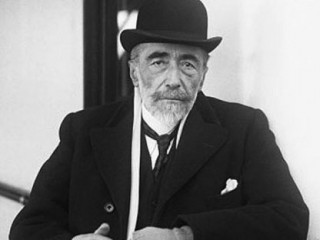
Joseph Conrad biography
Date of birth : 1857-12-03
Date of death : 1924-08-03
Birthplace : Berdyczew, Poland
Nationality : Polish-American
Category : Famous Figures
Last modified : 2010-09-01
Credited as : Writer and novelist, great short novel "The Heart of Darkness", films inspired by his books
0 votes so far
Childhood in Poland and Russia
Józef Teodor Konrad Nalecz Korzeniowski (Joseph Conrad) was born to Joseph Theodore Appollonius Korzeniowski and Evelina Korzeniowski on December 3, 1857, in Berdyczew, Poland. His father was a writer and a translator of the works of William Shakespeare (1564–1616). He was also a member of a movement seeking Polish independence from Russia. In 1862 the family was forced to move to Russia because of his father's political activities. Conrad's mother died three years later in 1865. It was not until 1867 that Conrad and his father were allowed to return to Poland.
In 1868 Conrad attended high school in the Austrian province of Galicia for one year. The following year he and his father moved to Cracow, Poland, where his father died in 1869. From the time spent with his father, Conrad became a lover of literature, especially tales of the sea. After his father's death, his uncle, Thaddus Bobrowski, took Conrad in and raised him.
Merchant marine service and marriage
As a teenager the future novelist began dreaming of going to sea. In 1873, while on vacation in western Europe, Conrad saw the sea for the first time. In the autumn of 1874 Conrad went to Marseilles, France, where he entered the French marine service. For the next twenty years Conrad led a successful career as a ship's officer. In 1877 he probably took part in the illegal shipment of arms from France to Spain in support of the pretender to the Spanish throne, Don Carlos (1788–1855). At about this time Conrad seems to have fallen in love with a girl who was also a supporter of Carlos. The affair ended in a duel with an American named J. M. K. Blunt. This was the first time Conrad thought of taking his own life.
In June 1878 Conrad went to England for the first time. He worked as a seaman on English ships, and in 1880 he began his career as an officer in the British merchant service, rising from third mate to master. His voyages took him to distant and exotic places such as Australia, India, Singapore, Java, and Borneo, which would provide the background for much of his fiction. In 1886 he became a British citizen. He received his first command in 1888. In 1890 he traveled to the Belgian Congo, Zaire, and Africa, which inspired his great short novel The Heart of Darkness.
In the early 1890s Conrad had begun to think about writing fiction based on his experiences in the East. In 1893 he discussed his work in progress, the novel Almayer's Folly, with a passenger, the novelist John Galsworthy (1867–1933). A year later he retired from the merchant marines and completed Almayer's Folly, which was published in 1895. It received favorable reviews and Conrad began a new career as a writer.
In 1896 he married Jessie George, an Englishwoman. Two years later, just after the birth of Borys, the first of their two sons, they settled in Kent in the south of England, where Conrad lived for the rest of his life. John Galsworthy was the first of a number of English and American writers who befriended Conrad. Others were Henry James (1843–1916), Arnold Bennett (1867–1931), Rudyard Kipling (1865–1936), Stephen Crane (1871–1900), and Ford Madox (Hueffer) Ford (1873–1939), with whom Conrad collaborated on two novels.
Early novels, political novels
From 1896 through 1904 Conrad wrote novels about places he visited as a merchant marine and he explored themes such as the uncertainties of human sympathy. His early novels included An Outcast of the Islands (1896), The Nigger of the "Narcissus" (1897), The Heart of Darkness (1899) and Lord Jim (1900).
The next three novels reflected Conrad's political side. The theme of Nostromo (1904) was the relationship between man's deepest needs (his psychology) and his public actions and decisions. The description of London, England, in The Secret Agent (1907) was similar to Charles Dickens's works. It portrayed a city of mean streets and shabby lives. In Under Western Eyes (1911) Conrad examined the Russian temperament.
Conrad's next novel, Chance (1914), was a study of solitude and sympathy. Because of its financial success and the efforts of his American publisher, he was able to live without worrying about money for the rest of his life. Victory (1915), his last important novel, further examined the theme of solitude and sympathy.
Last novels and death
Although Conrad's last novels, The Shadow Line (1917) and The Rover (1923), were written as a farewell, he received many honors. In 1923 he visited the United States to great fanfare. The year after, he declined an offer of knighthood in England.
On August 3, 1924, Conrad died of a heart attack and was buried at Canterbury, England. His gravestone bears these lines from Edmund Spenser (1552–1599): "Sleep after toyle, port after stormie seas,/ Ease after warre, death after life, does greatly please".
Films have been adapted from or inspired by Conrad's Victory, Lord Jim, The Secret Agent, An Outcast of the Islands, The Rover, The Shadow Line, The Duel, Heart of Darkness, and Nostromo.
Writing in the heyday of the British Empire, Conrad drew upon his experiences in the French and later the British Merchant Navy to create short stories and novels that reflect aspects of a worldwide empire while also plumbing the depths of the human soul.
















